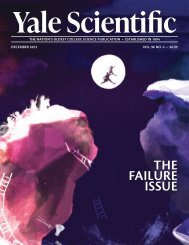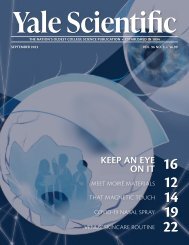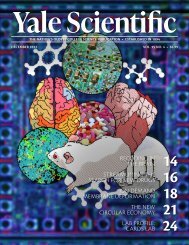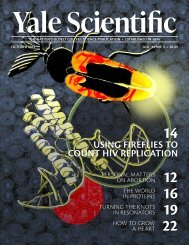YSM Issue 97.1
Create successful ePaper yourself
Turn your PDF publications into a flip-book with our unique Google optimized e-Paper software.
FOCUS<br />
Social Medicine<br />
GIVING VOICE TO<br />
THE VOICELESS<br />
The Black Youth<br />
Mental Health Crisis<br />
BY AIDEN WRIGHT<br />
IMAGE COURTESY OF AMANDA CALHOUN<br />
In October 2021, experts in youth mental health declared<br />
the mental health crisis among children and young adults<br />
a national emergency. At the time, Amanda Calhoun ’11,<br />
now Chief Resident of the Yale Albert J. Solnit Integrated Adult/<br />
Child Psychiatry program, was focused on studying the status of<br />
mental health outcomes for one group in particular: Black youth.<br />
Recent studies have revealed that Black youth face rising suicide<br />
rates. Calhoun noted that previous psychiatric research has also<br />
focused on how external factors like poverty, stigma towards<br />
mental health, and lack of education inhibit Black youth’s ability<br />
to access mental health care. However, Calhoun’s concerns went<br />
in a different direction. “As a psychiatry fellow, I couldn’t stop<br />
thinking about the medical racism Black youth and families<br />
face when they do access care,” Calhoun said. With this critical<br />
observation, Calhoun established the Black Youth Mental Health<br />
Clinical Case Conference Series at Yale.<br />
The case conference series, which began in January and concludes<br />
in June, seeks to interrogate real cases of anti-Black medical racism.<br />
At the center of every event lies a desire to humanize Black youth.<br />
One way Calhoun achieves this is through storytelling. “I wanted<br />
everyone to be able to relate to the struggle this child was having<br />
no matter what their background is,” Calhoun said. “I want people<br />
to feel like these children are in the room with us.” At the first case<br />
conference, Calhoun shared the compelling story of Christina, a<br />
young Black girl who was admitted to the hospital due to “out of<br />
control” behavior. During her stay, Christina’s already precarious<br />
situation was exacerbated by incidents of racism from her<br />
predominantly white medical team.<br />
Importantly, narratives like Christina’s illuminate how medical<br />
racism manifests itself. When white medical providers comment<br />
that Christina’s hair is “wild” or refer to her as the “Tasmanian<br />
devil,” they invoke a history of anti-Black medical racism. By sharing<br />
narratives like Christina’s, the case conference series emphasizes an<br />
important point: her story is not unique.<br />
Anti-Black racism is deeply embedded in the American<br />
medical system, and without a concerted effort, Black youth<br />
seeking mental health care will continue to be victimized.<br />
Notably, the cases discussed in the conference series are<br />
anonymized to ensure medical providers do not face<br />
retaliation. Calhoun herself is no stranger to the backlash<br />
that can arise from speaking out against medical racism. In<br />
2021, after giving the keynote speech at the White Coats for<br />
Black Lives demonstration at the Yale School of Medicine,<br />
Calhoun was the target of multiple death threats. “The death<br />
threats were not the most difficult part of being an activist.<br />
[…] What’s more difficult is getting people to stand up against<br />
racism,” Calhoun said. This encapsulates the ethos of the case<br />
conference series: to not only raise awareness but also to find<br />
solutions to medical racism.<br />
Another integral feature of the case conference series is the<br />
commentary of three expert discussants. Though the conference<br />
delves into issues of mental health, not all of the expert<br />
discussants are required to have a background in psychiatry.<br />
“We try to pull from diverse backgrounds,” Calhoun explained.<br />
“Most children will never see a child psychiatrist, […] but<br />
they will see their teacher, maybe their counselor, maybe their<br />
religious leader.” By inviting experts who hail from a variety of<br />
disciplines, the conference takes an interdisciplinary approach,<br />
harnessing diverse perspectives to tackle a complex issue. The<br />
conference is also designed to reflect this same diversity of<br />
thought in the audience; it is free to register, open to the public,<br />
and has a hybrid format to encourage attendance.<br />
In the future, Calhoun hopes the conference will be even more<br />
widely attended and lead to tangible initiatives and solutions.<br />
She also plans to consolidate all of the insights and discussions<br />
from the case conference series into a book that can be used as<br />
a reference for healthcare professionals. “It feels gratifying to<br />
take these stories and write [them] on paper. It feels like giving<br />
voice to the voiceless and giving space to stories that have been<br />
silenced,” Calhoun said. “There’s a lot of racist behavior in the<br />
medical system, and it needs to change, and one of the ways to<br />
do that is to start calling it out.” ■<br />
10 Yale Scientific Magazine March 2024 www.yalescientific.org

















